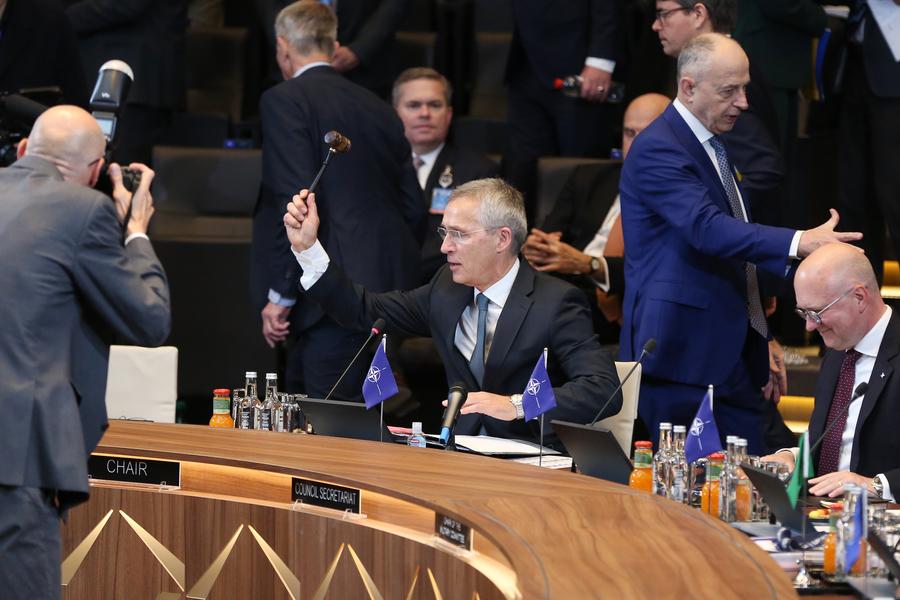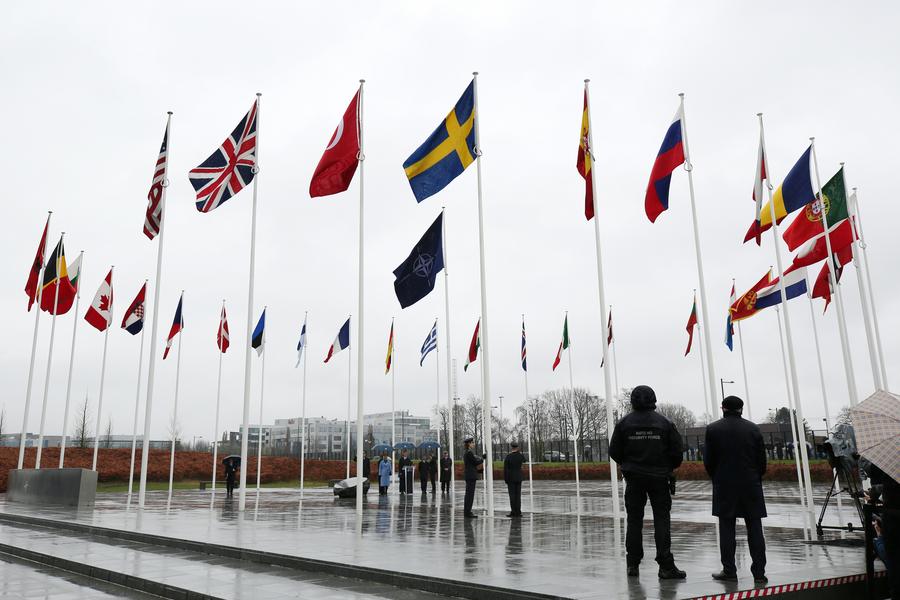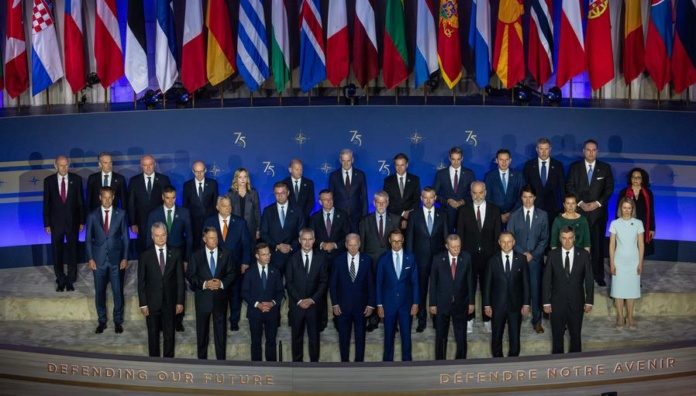The Washington Summit Declaration made by the NATO Council on July 11 can be seen as not only a response to the perceived Russian “expansionism” but also an inception of a new Cold War dividing the world into two blocs – one led by the US and its allies and the other composed of Russia and China and their allies.

Celebrating the 75th anniversary of NATO, the Washington Summit Declaration covers the following main points:
First, it vows to be a “defensive alliance” against all threats and to protect the “three core tasks of deterrence and defence, crisis prevention and management, and cooperative security.” The shared values of NATO nations are individual liberty, human rights, democracy, and the rule of law.”
Second, it welcomes the accession of Finland and Sweden that makes the alliance stronger.
Third, it denounced Russia’s “full-scale invasion of Ukraine” as shattering peace and security in the Euro-Atlantic area and undermining global security.
Fourth, it criticises China for harbouring “ambitions and (having) coercive policies” that challenge NATO’s interests, security, and values. Specifically, “the deepening strategic partnership between Russia and the People’s Republic of China and their mutually reinforcing attempts to undercut and reshape the rules-based international order are a cause for profound concern.”
Fifth, it strengthens the deterrence and defence of Ukraine while welcoming the leaders of Australia, Japan, New Zealand, and South Korea to join NATO as partners.
Sixth, it appeals to member nations to invest more in NATO operations and to increase their contributions.
Seventh, NATO’s deterrence and defence against all threats will be consolidated with high readiness forces, large-scale training, urgent actions, effective command, resilient logistics, and the integration of space and undersea infrastructure into its planning, exercises, and operations.
Eighth, the integrated air and missile defence of NATO is to be updated and enhanced.
Ninth, NATO declares that nuclear deterrence is its cornerstone of alliance security.
Tenth, NATO will enhance transatlantic defence and industrial cooperation, collective resilience, and the defence against aggressive hybrid action from state and non-state actors.
The Declaration is very critical of Russia, whose “aggression” against Ukraine is “a blatant violation of international law.” It calls for Russia to withdraw military forces from the Republic of Moldova and Georgia, while maintaining communication with Moscow to mitigate risks and prevent the escalation of war. NATO denounces Russia’s strategy of nuclear weapons in Belarus and its usage of chemical weapons in the Ukraine war.
The Declaration also criticises North Korea and Iran for “fueling Russia’s war of aggression against Ukraine by providing direct military support to Russia.”

Most importantly, the NATO Declaration accuses China of being “a decisive enabler” of Russia’s Ukraine war and of forming a “no-limits” partnership with Moscow. It appeals to China to “cease all material and political support to Russia’s war effort,” such as the transfer of dual-use materials like weapons and raw materials for Russia’s defence sector.
China’s response to NATO Declaration was swift, saying that it is “unreasonable with sinister motives” and asking the alliance not to bring about “chaos” in Asia. The Chinese Foreign Ministry added that China’s trade with Russia is based on the rules of World Trade Organization. China also supports Russia’s argument that NATO’s expansion poses a security threat to Russia, whose military move into Ukraine has brought about NATO’s strong Declaration.
The NATO Declaration coincided with the joint Chinese military exercise in Belarus, whose border with NATO member Poland appeared to arouse NATO’s geopolitical and security sensitivity. Belarus is Russia’s ally.
Analytically speaking, NATO’s Declaration was a response to not only Russia’s war in Ukraine, but also Vladimir Putin’s remarks at the SCO. In the SCO meeting in Kazakhstan, Putin demanded that Ukraine should withdraw its troops from those territories occupied by Russia, while China’s recent peace proposal has not really touched on the fate and return of any Ukrainian territory to Ukraine. In the recent SCO meeting, Putin added that Ukraine should not take advantage of any ceasefire to replenish its army through military mobilisation.
Russia has already turned down an offer by Turkey to mediate between Moscow and Kyiv. Putin’s emphasis that Kyiv should cede control over the disputed Ukrainian provinces to Moscow was a provocation to NATO whose Declaration was arguably understandable.
NATO’s Declaration coincided with Putin’s remarks at the recent BRICS Summit where he called for a multipolar world in which BRICS will play a key role. Such a call challenges the ideal of an unipolar world envisage and dominated by the US after the collapse of the former Soviet Union. The recent emergence of a Greater Russia, through its annexation of Crimea and its occupation of Ukrainian territories, has posed a serious security threat to NATO.
One of the BRICS members, India, has sought a peaceful resolution to the Ukrainian crisis. Prime Minister Narendra Modi talked to Putin, saying that wars cause the death of innocent children – a humanitarian remark that, however, did not appear to raise a concern from Putin. Perhaps as a nation whose ideologies of western-style democracy and independent foreign policy are acceptable to the bloc led by the US and that jointly led by Russia and China, India can ponder deeply further over the content of a peace proposal to resolve the Ukrainian crisis.
The NATO Declaration can also be seen as the emergence of a new Cold War in international politics. Its content points to the roles of China, North Korea, Iran, and Belarus in their support of Russia – a sign of two ideological and military blocs confronting each other from now onwards. The 32-member NATO Declaration appears to provide the “legitimacy” for some western nations, especially the US, to impose sanctions on those Chinese companies that are deemed to be providing dual-use materials for the Russian military arsenals.

Prior to the NATO Declaration, Hungary, as an EU member, asserted that it does not want NATO to become “an anti-China” bloc and that it will not support NATO’s moves. The Hungarian Prime Minister Viktor Orban has recently met Chinese President Xi Jinping to discuss a potential peace plan to tackle the Ukrainian conflicts. Hungary believes that Ukraine’s participation in NATO would create a real risk of open conflicts between Russia and NATO—indeed, a very dangerous scenario that would perhaps trigger a Third World War.
As such, it remains to be seen how NATO and its Western allies will handle Ukraine’s attempt at joining NATO. To Greater Russia, Ukraine has to be either a buffer state or a satellite state independent from NATO influence—a scenario rejected currently by Ukraine and NATO indeed.
NATO secretary-general Jens Stoltenberg said the alliance’s support for Kyiv will not make NATO a party to the Ukrainian conflicts. Rather, NATO’s support would help Ukraine uphold its right to self-defence. This argument, however, is rejected by Russia, which sees NATO members’ weapons provision to Ukraine as already a sign of NATO “expansionism.”
What provokes China in NATO’s Declaration is that NATO will discuss with Australia, Japan, New Zealand, and South Korea security cooperation—a move that is seen by China and North Korea as another sign of NATO “expansionism” into the East Asian security dynamics.
Clearly, two ideological, geopolitical, and military blocs of the world are taking shape, one including NATO, EU members (although Hungary is seen as “pro-China” and “pro-Russia”), Australia, New Zealand, Japan, and South Korea, while the other side embraces Russia, China, North Korea, Iran, Belarus, and SCO members.
The NATO Declaration can perhaps be viewed as a phenomenon showing an ongoing, difficult transition and persistent national power struggles from a previously unipolar world led by the US shortly after the collapse of the former Soviet Union to a new multipolar world consisting of many rapidly rising economic-military powers, notably Russia, China, Iran, and even North Korea.
If NATO’s closer cooperation with Australia, New Zealand, Japan, and South Korea is perceived negatively by China and North Korea, the East Asian region will likely encounter the risks of sudden military conflicts. The Philippines has already become more pro-US amid its disputes with China over the sovereignty of remote islands and reefs in the South China Sea. Manila’s improved military relations with Japan have also raised the eyebrows of Beijing.

Given the recent consolidation of military relations between North Korea and Russia, and given Japan’s military rearmament with US support in response to perceived military threats from China and North Korea, the security circumstances in East Asia are destined to become more volatile, unstable, and militarily unpredictable. Compounding the unstable circumstances is the Sino-US disputes over the question of Taiwan, whose future has triggered military and security concerns from Japan.
The mutual perceptions of nations on their “expansionist moves” here and there in the world has become a crucial factor leading to the looming new Cold War. If China is labelled unsophisticatedly as part of the Russia-led bloc, its potential and capability as a mediator in the Ukrainian conflicts are already curbed, unless China adopts a very unlikely scenario of distancing itself economically from Russia.
Fortunately, perhaps, shortly after the NATO Declaration, the military and defence leaders from the US and Russia have met to discuss their issues of common concerns. Perhaps the military diplomacy of all nations in the world should be maintained and enhanced to minimise, contain, or pre-empt any major military conflicts in different parts of the world.
In conclusion, the NATO Declaration has already set the stage for a looming new Cold War in the world. The lack of effective diplomacy conducted by national and military leaders can and will be extremely costly to the world if the Ukrainian crisis becomes a harbinger of an unnecessary Third World War that would involve different nations in rapidly confrontational and increasingly solidifying military blocs. Let us hope that political and military leaders of the two blocs will develop their stronger political will in the quest for diplomatic solutions to resolve territorial disputes, especially the Ukraine war, in the coming years.
*Sonny Shiu-Hing Lo is a political scientist, veteran commentator, and author of dozens of books and academic articles on Hong Kong, Macau, and Greater China




















